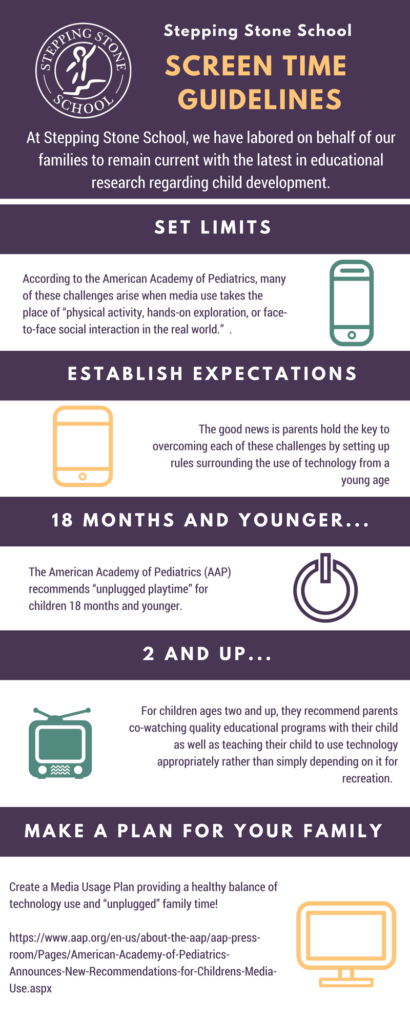Screen Time Guidelines
At Stepping Stone School, we continue to explore the latest research on behalf of our families to remain current with the most up-to-date educational practices regarding early childhood development. In doing so, we have closely monitored the developing body of research surrounding the use of technology in early childhood education. Our desire is to support families as they determine how best to balance healthy technology usage in their home while enabling their child to learn about the benefits technology offers.
In recent months, much research has surfaced regarding the effects of excessive technology use. Researchers across the globe have been collecting data to determine the outcome of observable changes in the cognitive and language development of children who have been exposed to handheld devices throughout infancy and into the toddler years. Studies link excessive screen time to difficulty sleeping, obesity, language delays, and challenging social behaviors. (AAP.org, 2016; Akpan, 2017; Hamilton, 2016; Margalit, 2016; Mayo Clinic, 2016)
According to the American Academy of Pediatrics, many of these challenges arise when media use takes the place of “physical activity, hands-on exploration, or face-to-face social interaction in the real world.” The good news is parents hold the key to overcoming each of these challenges by setting up rules surrounding the use of technology from a young age.
Guidelines for Screen Time
The American Academy of Pediatrics (AAP) recommends “unplugged playtime” for children 18 months and younger. For children ages two and up, they recommend parents co-watching quality educational programs with their child as well as teaching their child to use technology appropriately rather than simply depending on it for recreation. AAP strongly recommends parents monitor the kinds of shows being viewed and the on-line games being played to ensure they are appropriate quality programs.
As children become more independent on-line, parents should enforce the same rules from the “real world” to the “virtual environment” by encouraging children to act appropriately while on-line (Examples include only connecting with people they know and trust and speaking appropriately while using social media).
In addition, AAP has created a Family Plan in accordance with their recent recommendations (link to AAP website: https://www.aap.org/en-us/about-the-aap/aap-press-room/Pages/American-Academy-of-Pediatrics-Announces-New-Recommendations-for-Childrens-Media-Use.aspx) which support families in creating a Media Usage Plan providing a healthy balance of technology use and “unplugged” family time.
Recognize the Benefits of Appropriate Screen Time
When parents participate with their child in viewing programming or playing educational on-line games, they not only create positive experiences around the use of technology, but parents help to connect their child’s virtual learning with real world experiences. For example, if a vocabulary word is introduced in a program, parents can help the child learn how to use the word properly throughout the day.
Parents should preview television shows, games, and apps to ensure quality age-appropriate learning experiences. Consider setting up parental controls to block or filter internet content and seek out information about new programs to determine if it meets the expected standards.
By developing household rules surrounding the usage of technology and creating a balance of technology use and “unplugged” time, parents can provide a safe and beneficial experience for their child.

Resources:
Akpan, N. (2017, May 4). “Toddlers’ screen time linked to slower speech development, study finds.” Retrieved from https://www.pbs.org/newshour/health/toddlers-screen-time-linked-slower-speech-development-study-finds
Hamilton, J. (2016, November 19). “Heavy Screen Time Rewires Young Brains, For Better And Worse” Retrieved From Https://Www.Npr.Org/Sections/Health-Shots/2016/11/19/502610055/Heavy-Screen-Time-Rewires-Young-Brains-For-Better-And-Worse
Healthychildren.org. (2017, May 4). “Handheld Screen Time Linked with Speech Delays in Young Children.” Retrieved from https://www.healthychildren.org/English/news/Pages/Handheld-Screen-Time-Linked-with-Speech-Delays-in-Young-Children.aspx
Margalit, L. (2016, April 17). “What Screen Time Can Really Do to Kids’ Brains: Too much at the worst possible age can have lifetime consequences.” Retrieved from https://www.psychologytoday.com/blog/behind-online-behavior/201604/what-screen-time-can-really-do-kids-brains
Mayo Clinic Staff. (2016, Nov. 18). “Screen time and children — How to guide your child.” Retrieved from https://www.mayoclinic.org/healthy-lifestyle/childrens-health/in-depth/screen-time/art-20047952?pg=2